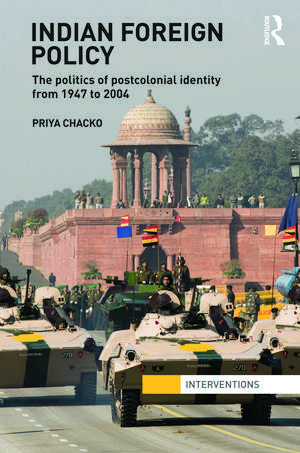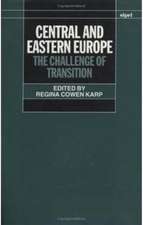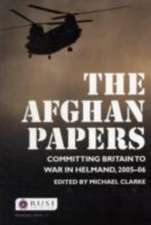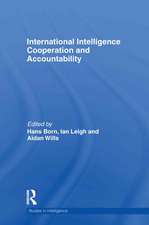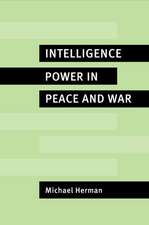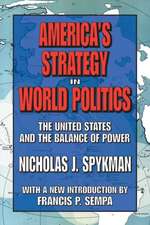Indian Foreign Policy: The Politics of Postcolonial Identity from 1947 to 2004: Interventions
Autor Priya Chackoen Limba Engleză Hardback – 28 noi 2011
Spanning the period between 1947 and 2004, the book focuses on key moments of crisis, such as the India-China war in 1962 and the nuclear tests of 1972 and 1998, and the approach to international affairs of significant leaders like Jawaharlal Nehru. The analysis sheds new light on these key events and figures and develops a strong analytical narrative around India’s foreign policy behaviour, based on an understanding of its postcolonial identity.
It is argued that a prominent facet of India’s identity is a perception that it is a civilizational-state which brings to international affairs a tradition of morality and ethical conduct derived from its civilizational heritage and the experience of its anti-colonial struggle. This notion of ‘civilizational exceptionalism’, as well as other narratives of India’s civilizational past, such as its vulnerability to invasion and conquest, have shaped the foreign policies of governments of various political hues and continue to influence a rising India.
| Toate formatele și edițiile | Preț | Express |
|---|---|---|
| Paperback (1) | 431.95 lei 6-8 săpt. | |
| Taylor & Francis – 12 sep 2014 | 431.95 lei 6-8 săpt. | |
| Hardback (1) | 1111.72 lei 6-8 săpt. | |
| Taylor & Francis – 28 noi 2011 | 1111.72 lei 6-8 săpt. |
Din seria Interventions
-
 Preț: 297.78 lei
Preț: 297.78 lei -
 Preț: 311.88 lei
Preț: 311.88 lei -
 Preț: 309.41 lei
Preț: 309.41 lei -
 Preț: 319.01 lei
Preț: 319.01 lei -
 Preț: 327.40 lei
Preț: 327.40 lei -
 Preț: 156.44 lei
Preț: 156.44 lei -
 Preț: 128.80 lei
Preț: 128.80 lei - 9%
 Preț: 1041.06 lei
Preț: 1041.06 lei -
 Preț: 112.30 lei
Preț: 112.30 lei -
 Preț: 123.84 lei
Preț: 123.84 lei -
 Preț: 302.16 lei
Preț: 302.16 lei -
 Preț: 286.65 lei
Preț: 286.65 lei -
 Preț: 310.45 lei
Preț: 310.45 lei -
 Preț: 111.26 lei
Preț: 111.26 lei -
 Preț: 312.36 lei
Preț: 312.36 lei -
 Preț: 309.70 lei
Preț: 309.70 lei -
 Preț: 311.48 lei
Preț: 311.48 lei -
 Preț: 379.30 lei
Preț: 379.30 lei -
 Preț: 279.25 lei
Preț: 279.25 lei -
 Preț: 189.29 lei
Preț: 189.29 lei -
 Preț: 302.99 lei
Preț: 302.99 lei -
 Preț: 342.06 lei
Preț: 342.06 lei -
 Preț: 443.86 lei
Preț: 443.86 lei - 18%
 Preț: 1055.06 lei
Preț: 1055.06 lei - 18%
 Preț: 999.51 lei
Preț: 999.51 lei - 25%
 Preț: 880.72 lei
Preț: 880.72 lei - 18%
 Preț: 1057.05 lei
Preț: 1057.05 lei - 18%
 Preț: 1001.90 lei
Preț: 1001.90 lei -
 Preț: 411.42 lei
Preț: 411.42 lei - 18%
 Preț: 1005.04 lei
Preț: 1005.04 lei - 18%
 Preț: 703.61 lei
Preț: 703.61 lei - 18%
 Preț: 1108.73 lei
Preț: 1108.73 lei - 18%
 Preț: 699.96 lei
Preț: 699.96 lei - 18%
 Preț: 1005.04 lei
Preț: 1005.04 lei -
 Preț: 409.69 lei
Preț: 409.69 lei - 18%
 Preț: 1055.32 lei
Preț: 1055.32 lei - 18%
 Preț: 1114.30 lei
Preț: 1114.30 lei - 18%
 Preț: 1056.00 lei
Preț: 1056.00 lei -
 Preț: 393.83 lei
Preț: 393.83 lei - 18%
 Preț: 1113.95 lei
Preț: 1113.95 lei - 18%
 Preț: 1053.79 lei
Preț: 1053.79 lei -
 Preț: 393.93 lei
Preț: 393.93 lei - 18%
 Preț: 1059.48 lei
Preț: 1059.48 lei - 26%
 Preț: 822.36 lei
Preț: 822.36 lei -
 Preț: 416.26 lei
Preț: 416.26 lei - 18%
 Preț: 1282.19 lei
Preț: 1282.19 lei
Preț: 1111.72 lei
Preț vechi: 1355.75 lei
-18% Nou
Puncte Express: 1668
Preț estimativ în valută:
212.72€ • 222.10$ • 176.06£
212.72€ • 222.10$ • 176.06£
Carte tipărită la comandă
Livrare economică 05-19 aprilie
Preluare comenzi: 021 569.72.76
Specificații
ISBN-13: 9780415665681
ISBN-10: 041566568X
Pagini: 248
Dimensiuni: 156 x 234 x 16 mm
Greutate: 0.53 kg
Ediția:1
Editura: Taylor & Francis
Colecția Routledge
Seria Interventions
Locul publicării:Oxford, United Kingdom
ISBN-10: 041566568X
Pagini: 248
Dimensiuni: 156 x 234 x 16 mm
Greutate: 0.53 kg
Ediția:1
Editura: Taylor & Francis
Colecția Routledge
Seria Interventions
Locul publicării:Oxford, United Kingdom
Public țintă
Postgraduate and UndergraduateCuprins
1. Introduction Part 1: India as a ‘Moral Power’ 1947-1964 2. Nuclear Technology, Disarmament and the Ambivalence of Postcolonial Identity 3. Rejecting the ‘Fear Complex’: Constructing an International Politics of Friendship 4. Friendship to ‘Betrayal’: The India-China War Part 2: Grappling with Postcoloniality: 1964-2004 5.Interventions and Explosions: Wither an Ethical Modernity? 6. India in South Asia: Danger, Desire, Friendship and Fraternity 7. Foreign Policy, Identity and the BJP: Correcting the 'emasculation of state power'? 8. Conclusion
Notă biografică
Priya Chacko is a Lecturer in International Politics in the School of History and Politics at the University of Adelaide, Australia. Her research interests include the normative basis of Indian foreign policy, non-Western thought in International Relations, and India’s engagement with Africa and global governance.
Descriere
The rise of India as a major power has generated new interest in understanding the drivers of its foreign policy. This book argues that a more complete account of state action can be produced by focussing on the role that ideas and discourse play in producing India’s state identity and shaping its foreign policy behaviour.
